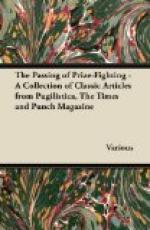After this momentous announcement, which transforms (subject to the opinion of the law-officers) every tenant-farmer into a pheasant-proprietor, Members took a little time to recover their breath. But some of them were soon hard at work again heckling the Government over the multiplication of new departments and secretariats. Mr. SWIFT MACNEILL, whose reverence for the Constitution (save in so far as it applies to Ireland) knows no bounds, could hardly contain his fury at the setting up of a War Cabinet—“a body utterly unknown to the law”—and the inclusion therein of Ministers without portfolios but with salaries.
[Illustration: THE GREAT PUSH. CONGESTION ON THE TREASURY BENCH.]
He received a certain amount of rather gingerly support from Mr. RUNCIMAN and Mr. SAMUEL, who had evidently not forgotten what happened to Mr. MCKENNA yesterday. Mr. SAMUEL was a distinguished Member of a Government under which both the Ministry and the bureaucracy were swollen in peace-time to unprecedented size; but that did not prevent him from complaining that under the present regime the Administration had been further magnified until, if all its members, including Under-Secretaries, were present, they would fill not one but three Treasury Benches. Already it is a much-congested district at Question-time and is the daily scene of a Great Push.
If underlying these criticisms there was a hope that they would draw the PRIME MINISTER from the seclusion of his private room, it was doomed to disappointment. Mr. BONAR LAW, asserting his position as Leader of the House, and not, as some people seemed to imagine, the PRIME MINISTER’S deputy, made a spirited defence of the new Ministerial arrangements as being essential for the conduct of the War, and challenged his opponents, if they wanted to make sure of the PRIME MINISTER’S presence, to move a Vote of Censure.
At Question-time Mr. LAW had instructed the House how to discover the emblems on the new Treasury Note—the rose, the thistle, the shamrock and the daffodil (this last for Wales). On the Treasury Bench the daffodil is rarely to be descried; but the thistle is in full bloom all the time.
Wednesday, February 14th.—To-day the Vice-Chamberlain of the Household bore a message from the KING in reply to the Address. The House on these occasions is apt to be less interested in the message than in the messenger, and watches eagerly to see if he will trip in his backward march from the Chair, or forget one of the customary three bows. The present holder of the office does his work so featly and with such obvious enjoyment as to give a new significance to the phrase ... “With nods and BECKS and wreathed smiles.”
Most of us only remember the late King THEBAW of Burma as a bloodthirsty and dissipated despot. It has been reserved for Sir JOHN REES to find a redeeming feature in his character. Among all his crimes, he never, it seems, prohibited the consumption of drink in his realm, though I fancy that his own efforts in that line considerably reduced the amount available for his subjects. Implored by the hon. Member not to turn Burma into a “dry” State, Mr. CHAMBERLAIN would say nothing more than that he declined (very properly) to take THEBAW as his model.




